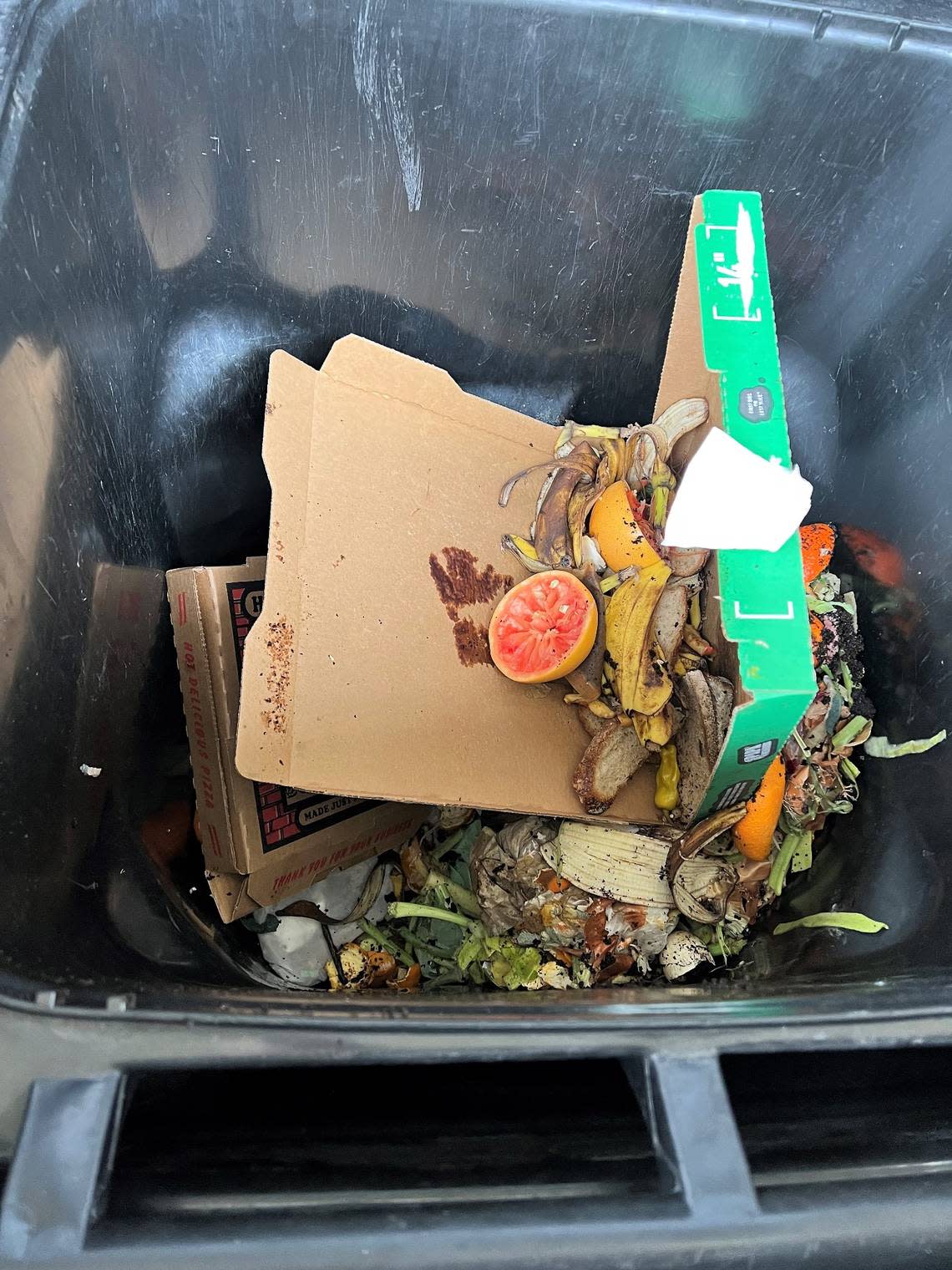Keeping food waste out of landfills: Here’s how to compost your scraps in Cary
Food waste doesn’t necessarily belong in landfills. It can be turned into a valuable resource: compost.
That’s according to the town of Cary and environmental advocates working to reduce waste in the area.
At the Citizen’s Convenience Center at 313 N. Dixon Ave., Cary residents can dump raw or cooked meat and bones, pizza boxes, paper plates and paper towels and other items into assorted bins.
The waste is picked up for processing every Monday, Wednesday and Friday. Some of the compost is returned to the earth at Good Hope Farm in Cary, said Srijana Guilford, Cary’s waste strategy and impact consultant.

The drop-off site began as a pilot program in February 2022 and surpassed its initial goal of collecting about 16 tons of food waste.
More than 72,000 pounds, or 36 tons, of food waste was collected last year, Guilford said. As of Wednesday, over 80,000 pounds have been collected.
“We’ve had over 12,000 food scrap drop-offs and that’s pretty amazing,” Guilford said. “It really blew our mind. Cary citizens are really supportive of environmental initiates. We’re really excited to see how they’ve adopted this service, and we’re proud to be able to provide it.”
Why waste reduction matters
Cary’s waste-reduction and diversion efforts were partly fueled by a 2019 study that found food waste made up 27% of what Cary was sending to the county landfill.
The U.S. Department of Agriculture reported that food is the “largest category of material placed in municipal landfills, where it emits methane, a powerful greenhouse gas.” Reducing food waste not only helps the environment, however, but also fights food insecurity and climate change, the department said.
“This service is just one option to help do that,” Guilford said. “When you do that, we really help to reduce waste and save space in the landfill. By keeping waste out, we help create compost that has many benefits when it’s used well, such as enriching soil and supporting healthy plant growth.”
It begins at home.
Residents should use a compost bin or compostable bags that can be stored in the freezer, refrigerator or on the counter or in cabinets until it’s time to drop them off.
“The material can be tossed in loose, so if (people) are using a container, they can just empty it or if they’re using bags, they can be tossed right into the carts,” Guilford said.
Getting started
Plastic bags are discouraged.
Residents can get compostable bags for free at the convenience center or get them in grocery stores or online.
They are stamped with the Biodegradable Products Institute, or BPI, logo, Guilford said. This ensures the bag will break down at the compost facility.
Cary resident Jill Denbow started bringing her food scraps to the convenience center last year during the town’s pilot program, which she first learned about on Facebook.
She didn’t start using the system until she went to a harvest festival at Good Hope Farm.
“I hate that food scraps end up in a landfill, which is not only bad for the environment, but also very wasteful,” Denbow said. “I’ve always wanted to compost, but I haven’t taken the time to learn how to do it in my own yard. This program is a great alternative.”
The process of composting your own food waste can involve digging holes in your yard to bury waste, giving it to animals, or using fermenting bins. The town of Cary and Good Hope Farm offers classes for backyard composting.
At Denbow’s house, she placed a bin on her counter designated for food waste. When it’s full she places the bags in the freezer. She also placed a flier from the Town of Cary in a cabinet door helping guide her family or visitors about what can be composted.
“I go once a week and I fill a 48 quart cooler with the bags,” Denbow said. She lives about 15 minutes from downtown Cary. “If I lived further away, I don’t know that I would use the service as often.”
Do you live in western Wake County? Sign up for this free weekly newsletter
The current drop-off location is near downtown Cary which can be a long drive for residents in the western parts of town. Guilford said there are talks of opening a second location in the town.
What is accepted at the drop-off
Food scraps — including raw or cooked fruits, vegetables, eggs, egg shells, cheese, breads, bakes goods, meat, bones, grains
Coffee grounds, filters and tea bags — without plastic
Paper towels and napkins — items used with cleaning products or materials are discouraged
Paper plates — only non-coated or non-glossy paper plates
BPI items
Pizza boxes — soiled or clean cardboard with no liners, foil or condiment packaging
Wet or dry pet food — no cans or plastic packaging
Unaccepted items
Plastic bags or packaging
Styrofoam
Metal cans
Liquids and oils
Twist ties and rubber bands
Labels and stickers
Other food waste locations
Wake County has four locations for residents. The food waste collected at each site is trucked to an industrial composting facility.
Much like the Cary location, residents are asked to remove all food from its packaging and place them in compostable bags available for free.
Look for the “Food Scraps Composting” sign and black collection carts in:
Apex — Convenience Center No. 2 at 6120 Old Smithfield Road
Raleigh — Convenience Center No. 4 at 3600 Yates Mill Pond Road
Raleigh — Convenience Center No. 7 at 9024 Deponie Drive
Wake Forest — Convenience Center No. 8 at Durham Road/N.C. 98
Visit wake.gov for more information on acceptable and unacceptable items.
Have questions about disposal items? Use the waste wizard tool at carync.gov/services-publications to pick an item and see how to recycle or dispose of it.
